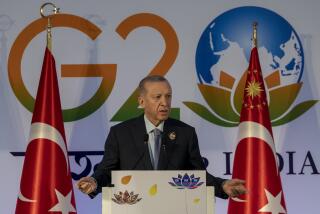Europe Is Courted by an Islamic Wolf in Secular Clothing
- Share via
He has a long history of Islamist militancy, for which he has spent time in jail, and he is still banned from public office because of it. And yet Recep Tayyip Erdogan, leader of Turkey’s Justice and Development Party, has been touring the U.S. and Europe to portray his movement as “a branch of the Western democratic tree.”
“We are the true secularists,” he told a group of journalists in Paris.
What is going on? For almost eight decades, Turkey has proudly described itself as the first secular state in Islam, thus drawing fire from fundamentalists. And now we have Erdogan telling us that the Turkish state is not secular; it needs his party to make it so. What could he mean?
In 1924, Kemal Ataturk, the founder of the Turkish republic, set up a Bureau of Islamic Affairs to assume some of the abolished caliphate’s functions. The bureau has assets worth billions of dollars. It controls thousands of endowment properties, from apartment blocks in Istanbul to farms in Anatolia. It also owns about 80,000 mosques and builds an additional 1,500 each year. It employs almost 100,000 people, including 45,000 imam-khatibs who lead prayers at mosques and deliver religious sermons. A 100-man team of writers produces sermons that are approved by the authorities before delivery.
The bureau is the only authority in Turkey allowed to issue fatwas, or religious edicts, and is in charge of censuring publications that might stray from the official path in matters concerning Islam.
“In Germany, the government does not dictate what is said in church on Sundays,” Erdogan says. “In Britain, girls can go to university wearing an Islamic hijab,” the nun-like head covering that has become the symbol of militancy since the 1970s. “In Turkey, however, speaking of Islam in your own way could land you in jail. And girls can certainly not enter universities or government offices wearing the hijab.”
The new Justice and Development government, headed by Prime Minister Abdullah Gul, has promised a series of constitutional amendments to change that.
Yet opponents of the party claim that Erdogan and Gul are playing the European card in a diabolical game aimed at removing barriers erected against radical Islamism over the decades.
The abolition of the Islamic affairs bureau would mean the transfer of huge assets to private religious groups that could interpret, promote and use Islam in whatever way they like, regardless of the interests of the state. Wresting away the control of state-owned mosques, shrines, holy places and businesses could provide the party with a strong and permanent presence in virtually every town and village. It could appoint thousands of its militants to influential and profitable positions and make sure that its preachers control all the mosques.
In Erdogan’s system, the state and the mosque would be strictly separate, which would please some Westerners who support a secular system. But the party could control the mosques through its appointees and use the religious network to control enough of the electorate to keep itself in power for years.
Erdogan’s appearance and discourse are deceptive. He has not grown a fundamentalist-style beard. And his wife wears a colorful headscarf rather than a hijab.
But Erdogan is as much caught in his contradictions as are his opponents because the whole debate about secularism is out of place in Islam. Secularism is relevant in a Christian context because Christianity regards the realms of God and of Caesar as distinct.
No such distinction is possible in Islam, in which attempts by either religion or state to impose itself on the other lead to discord and disaster.
When Erdogan and Gul say they want to make Turkey “fully European,” they should carefully contemplate what this means. There may be no diabolical design, but a single political party controlling the nation’s religious assets in the name of separation of mosque and state could undermine Turkey’s multiparty democracy.
The way out must be sought within the Islamic tradition, which allows civil society to control the mosques and religious endowments but forbids their use for partisan political purposes.
More to Read
Sign up for Essential California
The most important California stories and recommendations in your inbox every morning.
You may occasionally receive promotional content from the Los Angeles Times.













